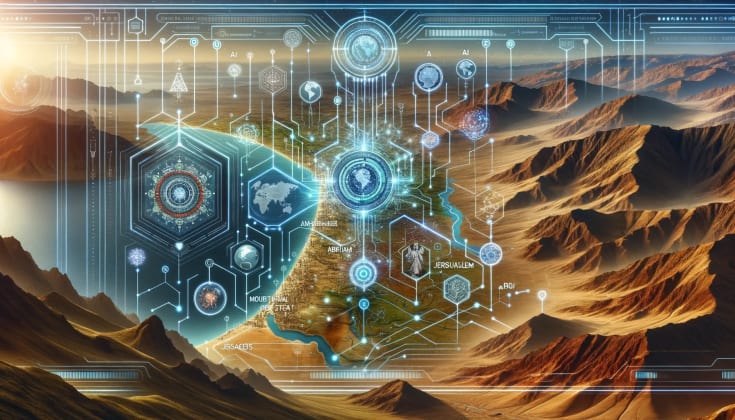In my years of exploring the intersection of faith and technology, I've come to a controversial realization: Artificial Intelligence isn't just for tech enthusiasts; it's for our grandmas and grandpas too! Let's face it, many older adults feel isolated and misunderstood in today's digital age. But with AI, we have a powerful tool to bridge the generational divide, making the Bible more accessible and interactions more meaningful.
Recent studies show that over 40% of older adults experience loneliness, which negatively impacts their health and well-being. Yet, AI can play a role in alleviating this loneliness by enhancing intergenerational connections. In this blog post, I'll uncover these fascinating possibilities and share how we can leverage AI to unite different age groups in our Christian communities.
We'll cover:
- The impact of AI in fostering intergenerational understanding
- Real-world examples and testimonies from the community
- Practical steps for integrating AI tools like FaithGPT into your daily life
- Scriptural insights on the importance of intergenerational relationships
Understanding the Modern Christian's Pain Points
Loneliness and Isolation Among Older Adults
John 15:12 teaches us to "love one another as I have loved you." Yet we often overlook our elders who might be feeling isolated. Statistics show that over 40% of elderly individuals experience loneliness, which negatively impacts their health.
Why Loneliness Matters
- Mental Health: Prolonged loneliness can lead to depression and anxiety.
- Physical Health: Studies reveal loneliness increases the risk of premature death by 26%.
- Spiritual Health: Isolated elders often feel disconnected from their church community, which can affect their spiritual growth.
"The church should be a family where everyone belongs, both." - Pastor Rick Warren

The Disconnect Between Generations
Often, the gap between generations feels like an insurmountable barrier. Younger people might feel they can't relate to the experiences of older adults, while older adults may struggle with modern technology or social norms.
- Youth Perspective: Younger individuals may see the older generation as out of touch.
- Elder Perspective: Older adults may feel overwhelmed by new technologies and rapid cultural changes.
My Journey with AI and Faith
As a software developer, and a Christian deeply committed to my faith, I have experienced firsthand the transformative power of AI in my spiritual walk. Combining these two passions led me to create FaithGPT,an AI-powered collection of Bible study tools designed to make Scripture more accessible for all.
A Tool, enhancing them. It assists in understanding the Bible, fostering conversations, and bridging gaps between generations.
“Bear one another's burdens, and so fulfill the law of Christ.” - Galatians 6:2
Real-world Applications
- Bible Study Assistance: FaithGPT can suggest relevant Bible passages, provide historical context, or answer theological questions.
- Personal Devotionals: Tailored devotionals for individuals at different stages of life, from youth to seniors.
The Significance of Intergenerational Relationships
Biblical Foundations and Principles
The Bible is replete with instances where God encourages intergenerational solidarity. Titus 2:3-5 instructs older women to train younger women, showcasing a divine design for mutual edification across age groups.
- Proverbs 20:29: "The glory of young men is their strength, gray hair the splendor of the old."
- Deuteronomy 32:7: "Remember the days of old; consider the generations long past. Ask your father and he will tell you, your elders, and they will explain to you."
Why Intergenerational Ministry Matters
- Wisdom and Experience: Older adults bring a wealth of experience and biblical knowledge.
- Energy and Innovation: Younger generations contribute fresh perspectives and enthusiasm.
- Balanced Community: Combining the wisdom of the old and the energy of the young leads to a balanced and fruitful church life.

"Iron sharpens iron, and one man sharpens another." - Proverbs 27:17
Practical Steps to Integrate AI in Intergenerational Ministry
Utilizing AI for Bible Studies
AI can help in creating customized Bible studies that cater to different generational groups within the church.
- Select a Topic: Choose themes that resonate across age groups, such as "The Parables of Jesus" or "The Fruit of the Spirit."
- Generate Questions: Use FaithGPT to generate discussion questions that invite input from different generations.
- Share Insights: Encourage each group to share perspectives, enriching the study through diverse viewpoints.
Tailoring AI Tools for Personal Growth
AI tools can also support individual spiritual growth. FaithGPT, for example, can offer personalized devotionals tailored to one's spiritual journey.
- For Youth: Short, engaging devotionals that incorporate modern examples and interactive elements.
- For Adults: In-depth studies that challenge and inspire deeper understanding.
- For Seniors: Simplified versions focusing on comfort and reassurance.
“Train up a child in the way he should go; even when he is old he will not depart from it.” - Proverbs 22:6
Creating Faith-Based Programs with AI
Creating AI-driven programs can also foster intergenerational connections within church settings.
Mentorship Programs
Using AI, churches can set up mentorship programs more effectively by matching older adults with younger members based on their needs, skills, and spiritual gifts.
- AI Matching: Utilize FaithGPT to match mentors and mentees based on data inputs.
- Guided Interactions: Provide AI-generated conversation starters and topics.
- Feedback Mechanism: Use AI to gather feedback and continually improve the program.
Prayer Partnerships
Establish prayer partnerships where older and younger members pray for one another. AI can help track prayer requests and updates.
- Initial Pairing: Use FaithGPT’s matching algorithm to initiate partnerships.
- Prayer Journals: Provide digital prayer journals to document prayers and answers.
- Regular Updates: Send AI-generated reminders and updates.
"For where two or three gather in my name, there am I with them." - Matthew 18:20
Real-world Examples of AI Bridging the Generational Gap
The Story of St. Paul's Church
At St. Paul's Church, utilizing AI has been transformative. I spoke with Pastor Rebecca who shared their success story.
- Intergenerational Bible Study: By using FaithGPT to structure their studies, they saw a 30% increase in participation from both young and old members.
- Enhanced Engagement: Older members who felt left out began to engage more as AI tools made Scripture more accessible.

"FaithGPT helped our community come alive. It enriching it." - Pastor Rebecca
Real-life Testimonies
Martha and Jacob: A grandmother and grandson pair who started using FaithGPT for shared Bible study.
- Martha says: "Jacob and I now have deeper discussions. He helps me with the tech part, and I share my life experiences."
- Jacob adds: "I understand my grandma better now, and we have a new way of bonding over Scripture."
Theological Considerations of Integrating AI
As Christians, it’s essential to reflect on the theological implications of integrating AI into our practices.
AI as a Gift, Not a God
We must remember AI is a tool,a gift from God,not a replacement for human relationships or divine guidance.
- Psalm 146:3: "Do not put your trust in princes, in mortal men, who cannot save."
- 1 Timothy 6:17: "Command those who are rich in this present world not to be arrogant nor to put their hope in wealth, which is so uncertain, but to put their hope in God, who richly provides us with everything for our enjoyment."
“Technology should be our servant, not our master.” - Pope Francis
Ethical AI Use in the Church
Ensuring ethical AI use aligns with our values is crucial. This means transparent algorithms, privacy protections, and fostering genuine human interaction.
- Transparency: Use open algorithms that align with Christian ethics.
- Privacy: Protect user data rigorously.
- Human Interaction: Ensure AI assists but never replaces genuine human relationships.
Overcoming Challenges in Implementing AI
Resistance to Change
Change can be hard, especially when it involves integrating new technologies into traditional settings like our churches.
Addressing Concerns
- Education and Awareness: Conduct workshops to educate members on the benefits and ethical use of AI.
- Inclusivity: Ensure everyone feels included in the transition, particularly older members who might struggle with technology.
Potential Misuse of AI
The potential for misuse is real, and it’s vital to have safeguards in place.
- Accountability: Set up accountability and oversight teams to monitor AI use.
- Ethical Guidelines: Draft and follow ethical guidelines for AI integration in church activities.
How to Get Started with AI in Your Church
Step-by-Step Guide to Implementing FaithGPT
- Introduction to Leaders: Share the vision and potential of FaithGPT with church leadership.
- Training Sessions: Conduct training for various groups within the church on how to use the tool.
- Pilot Programs: Start with small pilot programs such as a single intergenerational Bible study.
- Feedback Loop: Create a channel for feedback and continually improve based on user experiences.

“Where there is no guidance, a people falls, but in an abundance of counselors there is safety.” - Proverbs 11:14
Continuous Learning and Adaptation
AI technology is constantly evolving, and it’s essential to stay updated.
- Annual Reviews: Conduct annual reviews of the AI tools in use.
- Feedback Sessions: Hold regular feedback sessions with users to identify areas for improvement.
- Upgrading Tools: Continually upgrade and adapt AI tools to better serve the community.
Conclusion: Embracing AI as a Bridge, Not a Barrier
AI offers incredible opportunities to foster intergenerational connections within our Christian communities. By embracing AI like FaithGPT, we can bridge the gap between generations, making the Bible more accessible and enhancing our collective spiritual journey.
Let’s continue to use these tools responsibly to deepen our faith and strengthen our communities. Remember, AI is enhancing our collective ability to understand and share God's Word.
“There is neither Jew nor Gentile, neither slave nor free, nor is there male and female, for you are all one in Christ Jesus.” - Galatians 3:28
Checkout our other related articles:
- Using AI to Enhance Small Group Matching and Formation
- AI-Powered Platforms for Virtual Christian Communities
For those interested in learning more about how AI can foster intergenerational connections, here are some additional resources:






